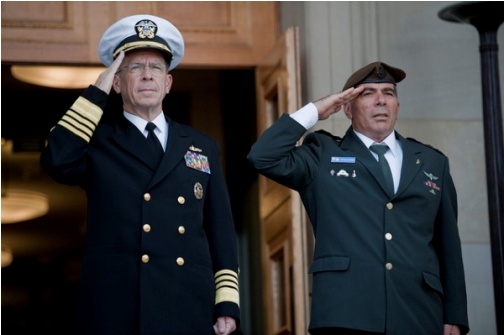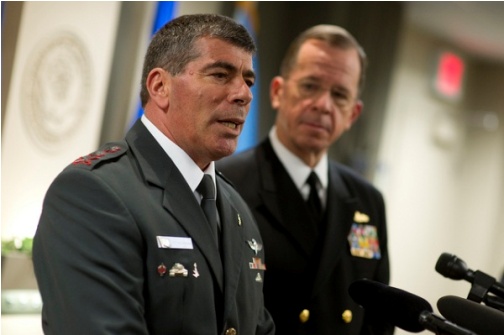WASHINGTON, Dec. 27 (KATAKAMI / Yonhap) -- U.S. Defense Secretary Robert Gates will visit South Korea next month to discuss enhancing the alliance with South Korea, the Pentagon said Monday.
Gates will meet with South Korean Defense Minister Kim Kwan-jin while in Seoul on Jan. 14, Pentagon spokesman Geoff Morrell said, adding they will discuss ways to "address the threats posed by North Korean provocations and its nuclear and missile programs."
The chief U.S. defense official will also travel to Beijing and Tokyo, Morrell said.
The visit comes amid rising tensions on the Korean Peninsula after North Korea's shelling of a South Korean island last month that killed four people in the first attack on South Korean soil targeting civilians since the end of the 1950-1953 Korean War.
North Korea had backed away from its earlier threat to retaliate to a series of military drills South Korea conducted independently and jointly with the U.S. in recent weeks in a show of force against further provocations.
The South Korean military, however, still remains on high alert.
New Mexico Gov. Bill Richardson, who traveled to Pyongyang earlier this month to help ease tensions, meanwhile, had briefed the State Department on his trip to North Korea, the department said.
Deputy spokesman Mark Toner, however, dismissed Richardson's trip as a private mission.
"Governor Richardson had called Deputy Secretary James Steinberg on Dec. 23," Toner said in a conference call with reporters. "U.S. citizens are free to travel to North Korea in a private capacity. It's not for us to give approval."
Richardson, former U.S. ambassador to the United Nations in New York, returned from a week-long trip to North Korea last week amid rising tensions after North Korea's shelling of Yeonpyeong Island and a series of military drills by South Korea in a show of force against further provocations.
The North has proposed a series of rapprochement measures to the troubleshooter.
Among them are the return of International Atomic Energy Agency (IAEA) inspectors, negotiations for the sale of 12,000 spent nuclear fuel rods and the establishment of a military commission consisting of representatives from the two Koreas and the U.S., and an inter-Korean military hotline to prevent conflicts in the disputed western sea border.
North Korea expelled IAEA monitors early last year in the wake of U.N. Security Council sanctions for a rocket launch seen as a long-range missile test. Months later, Pyongyang detonated its second nuclear device after one in 2006, drawing harsher U.N. sanctions.
Reports said Seoul and Washington have been discussing ways to revive the six-party talks on North Korea's denuclearization, which have been deadlocked over last month's shelling and the sinking of a South Korean warship in March.
The return of the international nuclear monitors is one of the preconditions Seoul and its allies have set for the reopening of the nuclear talks, involving the two Koreas, the U.S., China, Japan and Russia.
"Governor Richardson was kind enough to call Deputy Secretary Steinberg and offer his perspective on the trip and what he found out there," Toner said. "He brings a great deal of knowledge and we value his perspective. We value his perspective and his insights. Our policy remains the same, but obviously we welcome the input of individuals, private American citizens, with his level of expertise and knowledge."
Washington will continue to consult Beijing, North Korea's biggest benefactor, to resolve issues related to North Korea, he said.
"It has a unique relationship with North Korea," Toner said. "We're going to continue to work with China to urge North Korea to live up to its commitments, refrain from provocative actions and to act responsibly."
Richardson told CNN last week that now is the time for the U.S. to re-engage North Korea if Pyongyang refrains from reacting militarily to South Korea's military drills.
Seoul and Washington have dismissed the gestures as part of the North's traditional brinkmanship, urging Pyongyang instead to apologize for shelling Yeonpyeong and sinking the Cheonan before returning to the six-party nuclear talks.
South Korea and the U.S. also want the North first to take concrete steps toward denuclearization.
China and Russia want the nuclear talks to reopen as soon as possible unconditionally.
North Korea last month revealed a uranium enrichment plant that it claims is producing fuel for power generation. Concerns persist that the facility could produce highly enriched uranium for nuclear weapons.
North Korea will be among the topics at the summit between U.S. President Barack Obama and Chinese President Hu Jintao here on Jan. 19, U.S. officials have said, although Washington does not want the rising tensions on the Korean Peninsula to dominate the agenda. (*)
Please also visit : INDONESIAKATAKAMI.WORDPRESS.COM and News Portal KATAKAMI.COM (Indonesian Language). Follow KATAKAMI on TWITTER : WWW.TWITTER.COM/KATAKAMIDOTCOM
Tampilkan postingan dengan label Pentagon. Tampilkan semua postingan
Tampilkan postingan dengan label Pentagon. Tampilkan semua postingan
Desember 28, 2010
November 18, 2010
Photostream : IDF Chief of Staff, Lt. Gen. Gabi Ashkenazi meets US Chairman of the Joint Chiefs of Staff, Navy Adm. Mike Mullen

The IDF Chief of Staff, Lt. Gen. Gabi Ashkenazi continued his work visit to North America and was hosted (Wednesday, Nov 17, 2010) at the Pentagon by the United States chairman of the Joint Chiefs of Staff, Navy Admiral Mike Mullen. The photo show Navy Adm. Mike Mullen and Lt. Gen. Gabi Ashkenazi during the respective playing of their national anthems at the Pentagon ceremony welcoming Lt. Gen. Gabi Ashkenazi, after which both leaders addressed the media during a press availability. ( IDFSpokesperson.com / DoD photo by Mass Communication Specialist 1st Class Chad J. McNeeley/Released)

The IDF Chief of Staff, Lt. Gen. Gabi Ashkenazi continued his work visit to North America and was hosted (Wednesday, Nov 17, 2010) at the Pentagon by the United States chairman of the Joint Chiefs of Staff, Navy Admiral Mike Mullen. The photo show Navy Adm. Mike Mullen and Lt. Gen. Gabi Ashkenazi during the respective playing of their national anthems at the Pentagon ceremony welcoming Lt. Gen. Gabi Ashkenazi, after which both leaders addressed the media during a press availability. (DoD photo by Mass Communication Specialist 1st Class Chad J. McNeeley/Released) ( IDFSpokesperson.com / DoD photo by Mass Communication Specialist 1st Class Chad J. McNeeley/Released)
Top US, Israeli Military Leaders Meet Amid Iran Controversy
November 17, 2010 (KATAKAMI / VOA) --- The top U.S. and Israeli military officers met Wednesday amid some disagreement among senior leaders of the two countries on how best to pressure Iran to abandon its alleged nuclear weapons program. The Chairman of the Joint Chiefs of Staff, Admiral Mike Mullen, hosted his Israeli counterpart, General Gabi Ashkenazi at the Pentagon
Last week, Israeli Prime Minister Benjamin Netanyahu called for a "credible military threat" from the international community to convince Iran's leaders to abandon their nuclear program. But U.S. Defense Secretary Robert Gates disagreed, saying in a separate appearance that international sanctions are having more impact than had been expected, and should be given more time to work.
On Tuesday at the Pentagon, Netanyahu's military chief, General Ashkenazi, agreed that the sanctions are having an impact, but questioned whether that will be enough.
"The real question here [is whether] it's sufficient enough to persuade the Iranians to change the course of action in terms of the nuclear program," said Ashkenazi. "And that has to be determined. And we still have some time to watch it and see what will be the final outcome."
General Ashkenazi would not say how long he thinks the international community can wait before threatening or taking military action.
The top U.S. military officer, Admiral Mullen, said the military option has never been abandoned, but he echoed Secretary Gates' view that the sanctions are having a significant impact and should be given more time.
"I've certainly seen a body of evidence that indicates that the sanctions are taking their toll, much more rapidly than some had anticipated, more deeply," said Mullen. "They're very broadly supported. These aren't just U.S. sanctions, they're UN sanctions."
Admiral Mullen said he has no doubt Iran is trying to develop a nuclear weapon, and said that would be a "disaster for the region," and an "incredibly destabilizing" development.
Iranian leaders consistently deny charges they are trying to develop a nuclear weapon. (*)
Langganan:
Komentar (Atom)



